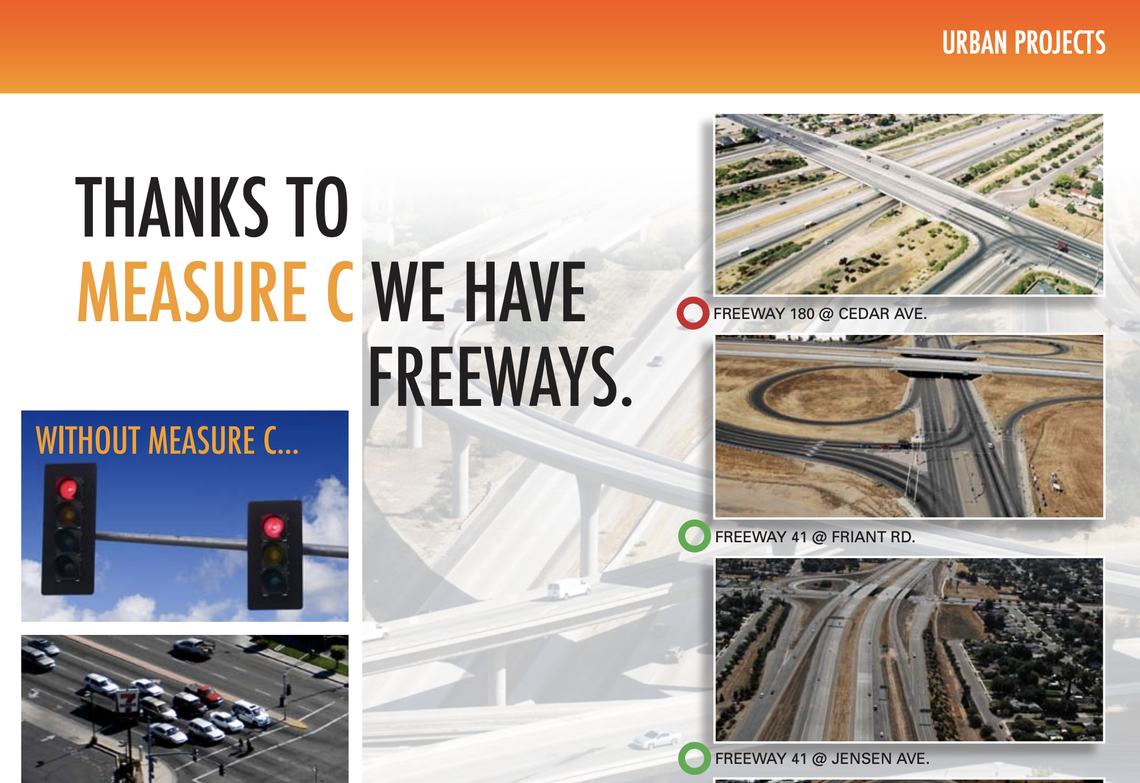Put a fork in Measure C. Lacking support from city of Fresno, renewal effort is dead
Measure C is DOA.
Not the current version of Fresno County’s half-cent transportation tax, which expires in 2027. I’m talking about the renewal effort that Measure C proponents are rushing to finalize in time to get it on the November ballot.
That process has been seriously flawed from the outset. Now, it’s simply doomed. Measure C has zero chance of getting a two-thirds majority vote without the backing of Fresno County’s largest municipality and especially its most prominent politician.
As things currently stand, they don’t have either.
This unexpected turn-of-events was supposed to be revealed during Thursday’s Fresno Council of Governments meeting — had the Measure C discussion taken place as scheduled. Instead, board members voted to postpone those talks until July 7 (5:30 p.m. at Fresno City Hall) after COG staff were unable to resolve repeated technology and translation glitches.
Opinion
Which is unfortunate in all sorts of ways. Because had the meeting not dissolved into chaos, a fairly large cat would’ve been let out of the bag: The city of Fresno and Mayor Jerry Dyer are no longer on board.
Who’s my source on this? None other than Dyer himself. Who confirmed that he, City Manager Georgeanne White, Director of Public Works Scott Mozier and Fresno City Councilmembers Miguel Arias and Tyler Maxwell (who both serve on the transportation subcommittee) crafted an alternative Measure C renewal plan that Mozier intended to present Thursday to the Fresno COG board.
“As a result of the recent workshop I requested for council conducted by (Fresno County Transportation Authority executive director) Mike Leonardo, and subsequent meetings I have had internally, the city of Fresno is very concerned that the current measure does not address the unique needs of Fresno as previously thought,” Dyer said via email.
Measure C is projected to yield $6.84 billion over 30 years for transportation projects. Yet Fresno County transportation officials did not release the final version of the allocation plan until Thursday morning ― hours before scheduled Fresno COG discussion, public comment period and vote.
What’s it like to organize in the Valley?
Fresno County transpo staff release final $6.84 BILLION sales tax plan on the *SAME* day it is scheduled for a vote and then send email below
Join us TODAY starting at 4:30! Corner of VanNess and Tulare. Follow @LCJandA for details! pic.twitter.com/zPYADJGASi— Veronica Garibay (@vgaribay19) June 30, 2022
Fresno relegated ‘to back seat of the bus’
Rather, city officials have been working off a draft version that, in Arias’ words, “relegates the biggest city in the county to the back seat of the bus” with regard to how those tax dollars will be spent.
For example, the current Measure C proposal reduces the funding pot for public transportation in the city of Fresno from 19.66% to 12%. According to Arias, that’s a difference of $5.35 per $100 collected and (if no other money is allocated) would result in the city having to eliminate more than 25% of its bus routes.
“City of Fresno residents rely more on public transportation than other Fresno county cities,” Dyer wrote. “The City of Fresno also relies on Measure C dollars to offset fares which allows us to leverage millions of dollars in state funding.”
To offset this shortfall and others, Fresno was given more flexible spending money. However, Dyer and Arias contend this is not a 1 to 1 ratio, meaning it would require an 11% increase in flexible dollars to make up for the 7.66% hit to public transportation. And if the decision was made to keep the FAX system whole, the city’s public works department would face severe cutbacks.
“We would be left with impossible choices,” Maxwell said.
Besides short-changing public transportation, language in the current proposal prevents money from the local roads fund to be used on anything besides pavement. That’s to the exclusion of other neighborhood infrastructure needs such as sidewalks, curbs and gutters.
“Rural areas in the county don’t have sidewalks; I can see why people there don’t care about them,” Arias said. “But that’s not the case in the city of Fresno.”

Future sprawl over inner city
Perhaps most bothersome of all, city officials were stunned to discover that several Tier I transportation projects (funded by Fresno’s slice of the Measure C pie) had been chosen for them by county officials and without their input.
Invariably, these projects (such as extending Veterans Blvd. from Shaw Avenue to Highway 180 and widening Temperance Avenue near 180) are located on Fresno’s outskirts and promote future sprawl. Fresno officials would prefer to fund projects that address current traffic issues in the city’s core.
Dyer and Arias say they’ve tried to work out a compromise but that county officials either won’t budge or not enough. Dyer said he’s “hopeful” all parties can come up with an alternative prior to Thursday’s rescheduled meeting. Arias and Maxwell would prefer to see the matter delayed until 2024.
“The current proposal is a bad deal for the city of Fresno,” Maxwell said. “Maybe we should wait two years to put together something the biggest city in the county can get behind.”
If county transportation officials insist on plowing forward, we might find ourselves in a situation where public funds are used to help defeat this version of Measure C at the ballot box. The city’s recently approved $1.9 billion fiscal year 2023 budget has $500,000 set aside for such purposes.
“We can’t tell people to vote for it or to vote against it,” Arias said. “But we have an obligation to educate our residents and inform them of the facts.”
Fact is, Measure C doesn’t have a chance without the backing of Fresno voters and its mayor. And until it does, this entire process is a waste of the public’s time and money.
